#arwad
Explore tagged Tumblr posts
Text
I finished the final epilogue of book 7, and am ready to talk about my thoughts on the conclusion to A Practical Guide to Evil
My spoiler-free review first; as a final act, book 7 sticks the landing, which is probably the highest praise I can give any work of fiction, short of "this literally changed my life", which I can only say about maybe a handful of stories, and even that doesn't necessarily entail a solid ending. We got one here, and that's fantastic.
I guess you could say that the practical guide to evil was the friends we made along the w-*repeated gunshots*
Okay, I'll just get right into it; Praes arc might be the single best arc in the series. I might love other specific moments more, but at this late stage the main conflict wasn't necessarily whether or not the Dead King war would end in victory - we had the 3 act setup to that in place, with book 5 being the protagonists building up to the first real victory, where the light of hope is first illuminated, book 6 is where they get on the backfoot, and hope dims, which means book 7 will be the final act where the darkest night gives rise to the brightest dawn. I suppose there was always a chance the series could subvert that expectation and end on a downer, but "absolute victory or defeat against Ultimate Evil" never really felt like the main conflict by the time we reached book 7. The real driving conflict was, what world is left behind by the cast? There was always a greater doubt to me as to whether the Age of Order was going to become a meaningful thing compared to the Age of Wonder. And while book 5 and 6 had the prelude to it in the Grand Alliance and the Truce and Terms shaping the world towards what the Liesse Accords promised, Praes is where the pivot occurs.
As with a concerning number of events tied to Cat, the pivot involves fire. But first, let's start with Wolof.
I'd said it in the past, and after the series conclusion can say it with confidence, that if Catherine is the main character, Akua stands as the "other main character"; at first an antagonist, then as Cat's true foil, into becoming a full protagonist who is, if anything, more doomed by the plot than even Cat herself, who has made a career off of selling, cutting and breaking herself down into what she needs to be to succeed. By contrast, Akua's greatest choice is how she will end, and how to be better than her past self in the process. And just like how their fates were intertwined since book 1, they pull on each other throughout book 7.
Akua is a stranger in her homeland, ever more alienated by those she used to admire and emulate. The constant imagery used throughout is the comparison of a knot and a noose; the joke being the only difference is whether there's a corpse at the end. At this point she does not want to become a corpse; which means more than basic survival, like she had since book 4. She does not want to die without becoming better before that. All the bemoaning and shame she feels of being looked up to for her greatest sin, means nothing without that burning desire to be better even if that won't change what happened. Whether she dies by the noose or escapes the knot, she still committed the crime she would be hanged for. But undoing the knot, overcoming it and choosing to do otherwise than let her past damn her without learning anything, that still matters. And so when the throne of the Dread Empire is within her grasp, she chooses to burn it all down instead. Literally.
To be fair the main burning was Amadeus' doing, but her final encounter with him was the real pivot, as he places the choice to decide her future doom in her hands; a humble match.
Taking a small step back, the lead up to this arc's finale, the Battle of Kala Hills:
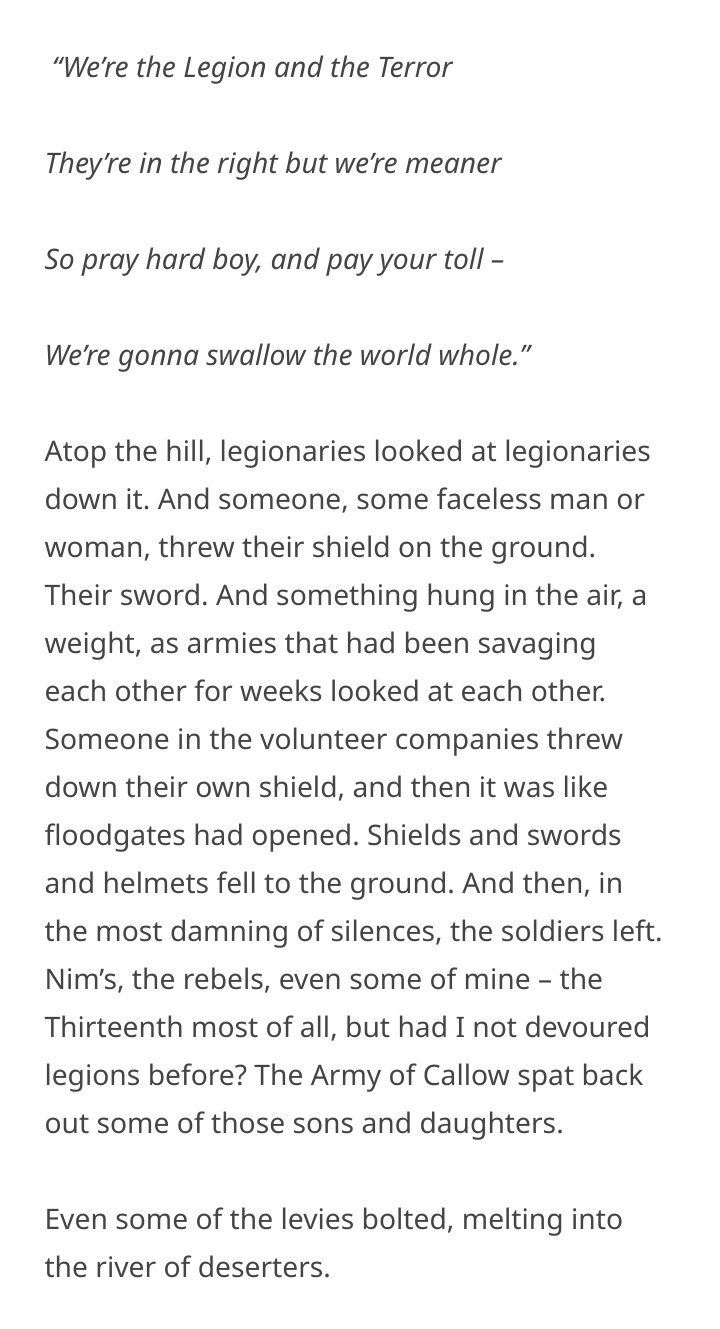
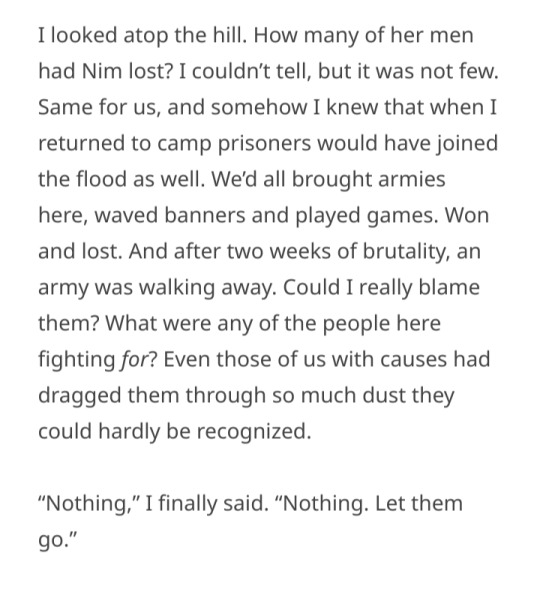
We've had battles against rebels, devils and demons, fae and crusaders. These soldiers have stomped through the mud on exhausting marches, ate and slept next to comrades who would die beside them, and now what even were they fighting? Other legionaries just like them, round and round the hills for weeks, bleeding, dying, defecting, "volunteered" to bleed and die more. Thousands died so a commander could set up a second encounter with the Squire and the Black Knight to confirm a Pattern of Three, two people who do not know each other and have no real reason to be rivals, because that was convenient for said commander. And those thousands and their comrades would never know or understand that. Shouldn't have to. Wouldn't if they did.
So they quit, en masse, to the tune of the Legionary's Song. The Legions of Terror, once the greatest and most feared army in the entire continent, broken at last by the ones who really matter, not the generals or the Named.
This is how an empire dies; when the people no longer believe in it.
The title of this chapter? Amadeus' Plan.
Despite never showing up in person, he has been working in the background to arrange this stalemate battle, to break the spirit of the Legions, and in so doing sew the seeds of the Dread Empire's fall that was to come.
Even counting the end of this arc with the literal burning of the tower, this might actually be my real favorite moment in the story, the one that will really stick with me for years after this has ended, and I think embodies so many of the themes that are being explored, and makes this more than a story about living tropes. No magic ended this, no Named shenanigans with Fate or feuds between Gods. The people took a stand, and there was nothing even the most powerful in all of Calernia could do about it.
Whatever else might be said about Amadeus as a character, this is where he became the GOAT for me.
Okay enough talk about the inspiring power of collective action, back to fantasy super heroes! Warden of the East babeeee! Immediately followed by baby stabbing daddy. Oof. Followed by the double wammy of Below's stories muted, leading to even more dire stakes.
And thus we reach act 2 of the book, which has what I consider, not the best part, but definitely the most fun sequence; Catherine's Super Villain plot with the flying tower and Arcadia traps, to sort out the whole Warden of the West claimant situation with Cordelia and Hanno. I adored this from start to finish; Catherine leaning as hard as she wants on those villain tropes now that there's no Role consequences to them was brilliant, and the way Cordelia and Hanno ended it by talking with each other and reaching the conclusion that actually, they both don't need the Warden of the West title to accomplish what they want to do, and instead challenge Cat, after she's spent the evening tearing both their world views apart, to trust both of them enough to accept a compromise. To escape this deadlock between the three of them if she'd give up some of that control she clings to so desperately. And she does, and steps down from what she thought she must do to make her dreams come true—being Below's representative, unable to trust anyone else in the role, less the Terms fail and her dream of the Accords dies—and awakens, at last, as the Warden. The officiator of all Named.
And here it becomes clear that, the Warden of the East and West Names? Were traps set by the Intercessor. She tried to nudge Cordelia to become Warden of the West before, and Agnes foiled that plot. Then the Intercessor succeeded with Cat, when she became Warden of the East. Had either Hanno or Cordelia become Warden of the West, they would be locked into Yara's plotting, in perfect position to destroy the Grand Alliance through conflicts between East and West, between Evil and Good. Then Cat came down with pure chaos and disrupted that story. There will instead be one Warden, but such is its role that the Name, the office, could be held by either Heroes or Villains when Cat no longer holds it. An authority over Named of all alignments, but not a leader or legislator of them, not at odds with either side. She will judge, and trust in others to carry it out. A far cry from the warlord she was, and absolutely not what the Intercessor necessarily wanted of her when she claimed Warden of the East.
I admit, I knew since at least book 4 that Catherine was going to end up with the Warden as her final Name, because wiki spoilers happen. Which did trick me into guessing her final fate would be that which she wished upon Akua; an eternal jailer. I did also guess it would be a neutral Name, which is true even if villain remains her Role.
But now that we're here, it makes a lot of sense. What did she want from the beginning, even when all she had as a plan was to change Praes bureaucracy from within? To get rid of the monsters. To reign them in, and to punish them. She didn't necessarily want to become a dictator, but it's what she thought she needed at the time to get there. She's always planned to abdicate her crown, and this role of Warden as the judge of Named, a check to their power that didn't exist until she ground its groove into Creation? Is perfect for her. Better still, it will carry on after her, to any who it calls to from either side of the wager. THIS was a more auspicious hint of the next world than any agreements made with the Grand Alliance to date. A glimpse of hope that it will carry on if she's no longer leading it; if she retires or dies, the dream won't have to die with her.
Which leads us into act 3 and the finale, taking the war to Keter. But first, some drow.
I once saw the Serolen arc rated as the overall worst arc of the series, and while I'll admit it's not the best, I still enjoyed it, for maybe no other reason than I enjoy a lot of what the Guide does with the Firstborn. The series has built them up overtime from these unknowable monsters, to an army of horror, to here, where they're making the first tentative steps to actually settle down and figure out what kind of people they're going to be.
All of which ends with what is my own personal favorite chapter, Hollow; Hallow:
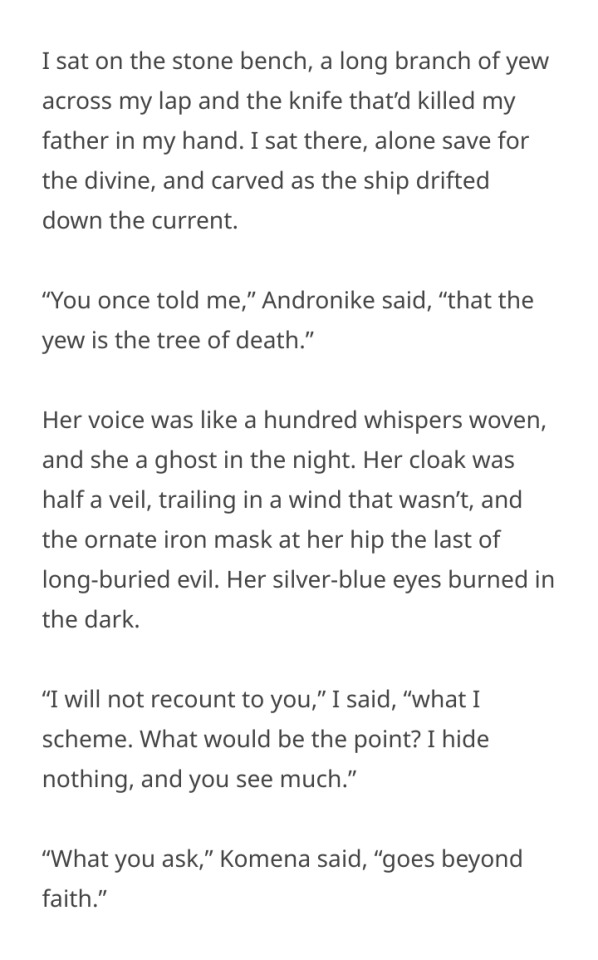
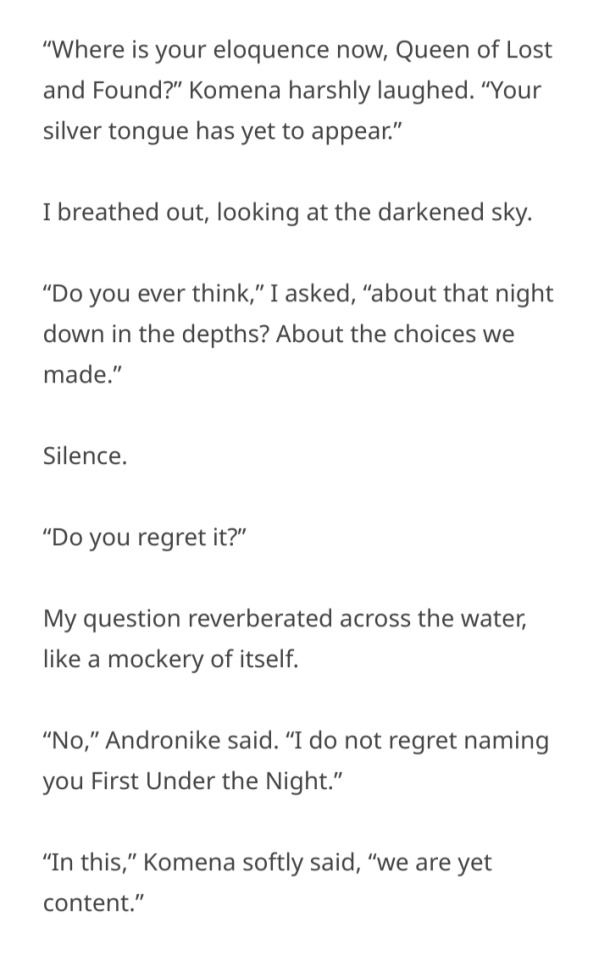

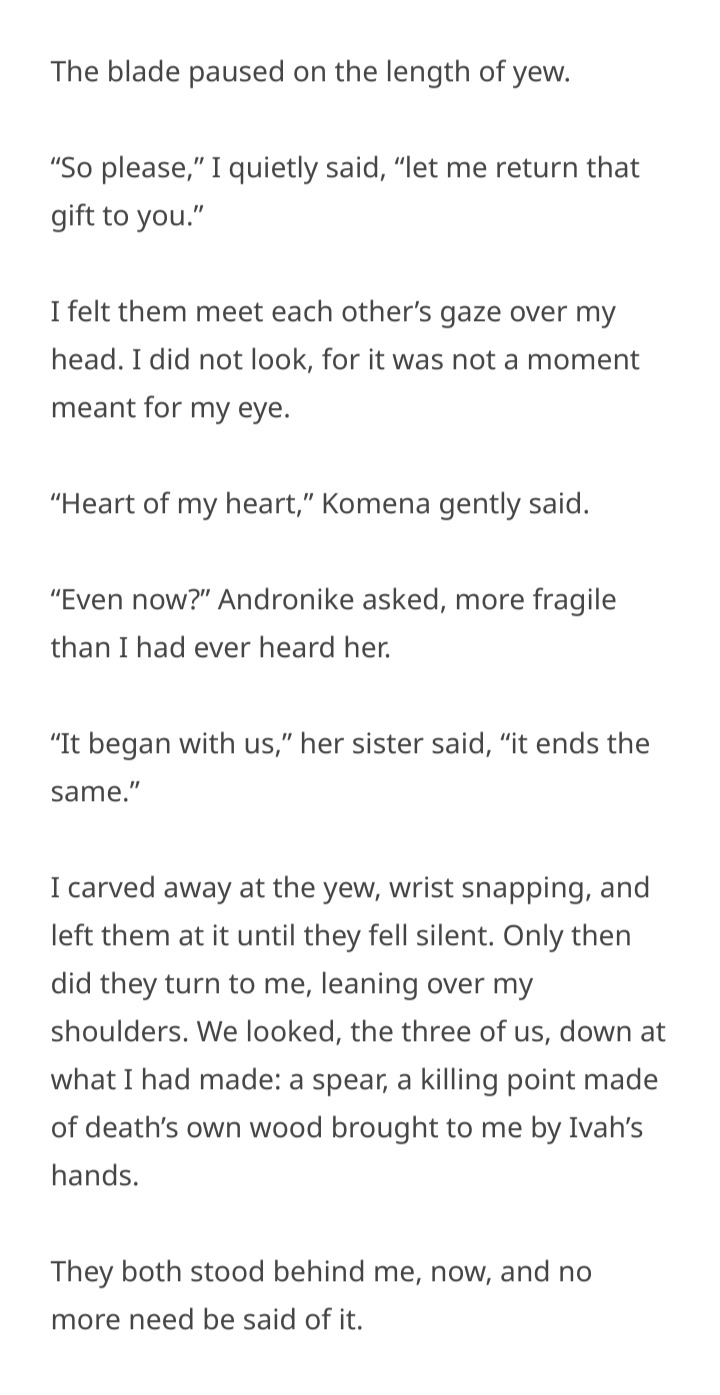
This, combined with the lead up from previous chapters, leads to a conclusion that confirms both the Sisters' trust in her, but her trust in the drow to change, and in Akua and Masego (but especially Akua). These moments are what make this my favorite chapter, and elevate the whole arc.
From there, we have only to face our final trial, that of Keter, and the massacre it promises. And that glorious moment when Cat puts on the plate and shield again, and leads her army over the bridges to the breach in the walls of the city, it felt like a return to form of book 2, when she was just beginning her career in waging war. It was nostalgic, for I missed that Cat for a long time.
And then, the final conflict, the facing off with Neshamah himself, the conclusion of which would be the beginning of the end. I've already given a lot of my thoughts in this post which also concludes Cat and Akua's arc together. And I stand by everything said in there; it's the best Enemies to Lovers plot I've read, easily. I remember seeing pretty early on, people comparing Akua's plotline to Zuko's from Avatar the Last Airbender, which even at the time I thought was high praise. I still do, and while it takes us 3 seasons to go from him as the villain at the start to being able to sit down with Sokka the latter laments his girlfriend having departed to become the moon, and saying in camaraderie "That's rough, buddy." How long it took for that one sentence to be earned. Here too, we've spent since book 1 with these two, from when they were the worst of enemies, to the most toxic of situationships, to a slow, gradual climb to mutual understanding, to the acknowledgement of past wrongs and the desires to make amends, and failing that, to atone in some way. All culminating, fifteen years later, with Akua returning as Calamity, the other half of Providence, once the Wandering Bard/Intercessor Yara of Nowhere, and for that one night, Catherine and Akua taking each other up in their embraces and finally sharing that intimacy that was denied in life. That kiss and embrace and fade to black, was also earned over the several million words that A Practical Guide to Evil has taken to reach that moment, that one night before dawn.
So, some conclusions to make I guess.
In all seriousness, this might be my new favorite book of the series. My absolute favorites tend to drift a bit between books 2, 5, and now 7. I know book 3 is where most people say the series really picks up, and that's true, and as much as I adored the fae arcs, and even enjoyed the everdark arc beyond just the ending, I actually have a hard time placing books 3 and 4, as while clearly superior in writing and world building to say, book 1, book 2 is where the greater cast really starts building out and becoming major players, as well as where the stakes truly start to get dire; the entire Marchford siege is easily my favorite battle in the series. Beyond that, book 5 has easily my favorite "version" of Cat, First Under the Night is both a really fitting way to do the whole Dark Priestess shtick that fits with her character, but also marks a return to her being frustratingly mortal, and how that serves as one of her strengths as well as a weakness.
And then book 7 brings that all together, with both a return to the Soldier Queen myth in the finale, as well as all those lessons in humanity coming together, not just for her but for every one of the main cast. Now that I say all that, I guess that just means Immortal Cat was what turned me off the most to books 3 and 4, and I was glad that phase had passed, even though I can look back now and see how that was an important phase for her and others to go through. Yeah, I think that might be it, cause otherwise I loved everything else about those books.
The epilogue is such a good wrap-up to the story as well, showing how the new Age of Order takes shape, how you can tell things have changed, that Calernia has entered a modern era; more and more Names are popping up than ever before, namelore being more easily accessible, knowledge passing down without being lost to the grave each time. Yet the Names are not as powerful, diminished with their numbers, but that's okay. It means the monsters of old aren't coming back. And if they try, the Warden and their enforcers will be there to stop them before another disaster like Second Liesse occurs. And even the Warden, is an office and Name that is passed down, as after Catherine steps down, Saban, previously the Archmage, steps into the Role and takes on Warden as her Name and duty. Meanwhile Cardinal grows, as a school to pass down all this knowledge. Masego achieved apotheosis in the most Masego way possible; he became a god to do more and bigger research. And in order to get the funding for said research, he would have to - *sigh* - teach. So the new godhead of magic to replace Neshamah becomes the most terrifying but also most sought after lecturer among the faculty. I couldn't ask for a better ending for him. He really grew from me being uncertain about his introduction, to really liking him, and glad that he was so closely involved in Cat's story right up to the end.
Speaking of Cat, while she lost Akua to both her own choice of penance and the debt she promised to see collected since the beginning, outside the two times they could spend together free of that burden before never seeing each other again. She never lost the Woe. All five of them made it, in the end. Masego and Indrani still are the Hierophant and Ranger respectively, and while no longer the Warden, Catherine will always carry the blessing of Night, which includes its extended lifespan ensuring she'll live for centuries. To Hakram and Vivienne, who after retiring from their positions are without Names (Vivienne faking her own death which is, WILD Viv, but I guess that's what you need to continue a dynasty), Cat casually shares a third of her lifespan to each of them, ensuring they'll live as long as she does, so they don't leave each other behind. Gods, I choked down a sob at that. One boat robbery later and:
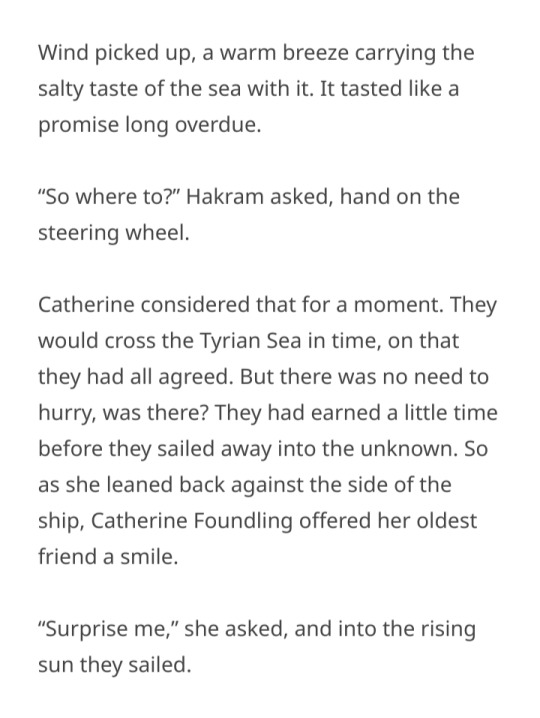
Thank you, David Verburg. This has been a pleasure and a joy to read.
I originally was going to follow up these thoughts on book 7 with thoughts on the series as a whole, but MAN, I've been at this for some time now, and I just got through book 7 and the conclusion, I don't have it in me to double this post's length talking about my thoughts overall cause there's Just. So. MUCH. So, I will save my thoughts overall for a later post.
Until next time.
#a practical guide to evil#apgte#apgte spoilers#spoilers#book 7 spoilers#catherine foundling#akua sahelian#amadeus of the green stretch#indrani#masego#hakram#vivienne dartwick#andronike#komena#hanno of arwad#cordelia hasenbach#yara of nowhere#intercessor#wandering bard#queue
19 notes
·
View notes
Text
Coin of the Day #309 (3/9/2025)
A little silver Phoenician…


Phoenicia
AR 1/12 Shekel or Obol - 9mm 0.66g
380-350 BC
Arados Mint
Obverse Head of Ba’al-Arwad right
Reverse Phoenician inscription
Galley right on waves
BMC 45-53
#coin of the day#ancient greece#arados#ancient phoenicia#phoenician#phoenicia#phoenician coins#greek coins#numismatics#coin#coins#ancient coins#ba’al-arwad#ba’al
2 notes
·
View notes
Text


Hanno of Arward and Cordelia Hasenbach cause I lowkey ship them, platonically speaking ╰(⸝⸝⸝´꒳`⸝⸝⸝)╯
#practical guide to evil fanart#practical guide to evil#zuzu's art#sketcbook#fanart#fantasy#Hanno of Arwad#Cordelia Hasenbach#white knight#First prince#traditional art#markers#prince#water#character art#character design
12 notes
·
View notes
Text
The constant hum of the reactor makes it hard to sleep.
- Arwa Rashid
8.14.1997 (22:36)
1 note
·
View note
Text
Har Kasam Tod Di Aaj Tumne New Sad Love Story Song | Agam Kumar Nigam | Phir Bewafai | AkgMusical
youtube
Har Kasam Tod Di Aaj Tumne New Sad Love Story Song is taken from the Phir Bewafai Album. And Agam Kumar Nigam has sung it in a sweet and painful voice touching the hearts of the people.
#har kasam tod di aaj tumne new sad love story song#har kasam tod di aaj tumne#har kasam tod di aaj tumne song#har kasam tod di#हर कसम तोड़ दी आज तुमने#phir bewafai#har kasam tod di aaj tumne male version#har kasam tod di aaj tumne new version#har kasam tod di aaj tumne new song#phir bewafai song#har kasam tod diya tumne#agam kumar sad songs#kasam tod di aaj tumne#har kasam tod di aaj tumne gaana#har kasam tod di aaj tumne arwade bhi#bulaya aaj tumne#Youtube
0 notes
Note
aiming the villain beam at Hanno of Arwad what do you think it would take to break that man
Change the circumstances some - just remove Cordelia's redemption/competence-enhancement arc, and then especially on't cut off his connection to the Choir - and it's relatively easy to imagine him ending up a villain in the narrative sense. Lean into the whole 'Lord White' persona, standing in judgement over the clerical grandees and secular elites alike, and cutting a bloody swathe through all those judged wanting. Giving up faith in failable and failed humanity entirely, and de facto ruling Procer as a Viceregent of the Heavens. Morally pure, consistent in his principles, holding each and every person whose conduct troubles or offends him to account.
'We would all be fools to pray for justice' and all that.
Cat would hate him, though probably not as much as Black.
38 notes
·
View notes
Text
He's probably my favorite hero along with Roland.
The comparison with Detect Evil is spot on. It's a DnD ability I definitely don't care for, but the coin flip from Hanno is fascinating and I love it's in here. I'm reminded of the interludes covering the coup against Cordelia, the one with the pov of a random looter, where Hanno shows up and just starts. Butchering the crowd as the coin flip result flashes in his eyes every time he glances at someone. He even kills the shopkeeper cause Judgement decreed it. But then Judgement spares our pov character and he leaves him be. And we're left almost as baffled as our looter.
Alright. I need to ramble out a monologue about Hanno of Arwad, and how's he actually really interesting, thematically. (To finally cross him off the list of characters I have Thoughts about, if nothing else.)
When Hanno first shows up in Guide, it seems all but assured that he's going to end up an antagonist. He's in a band with the Bard (who has something bigger going on, even if the larger details aren't yet clear), he's got Chekhov's Training Montage as a backstory superpower (similar to the what William got in Arcadia), and his unique gimmick is flipping a coin (exclusively a villain move in other media). He seems set up to be be Cat's new heroic rival, and Black theorizes his Aspects were designed to counter her. Even their mottos clash: "I do not judge," vs. "Justifications only matter to the just."
Textually, Hanno seems like a threat because he's working for a Choir of angels, the same creatures that doomed William and tried to flip Cat. And this is a fair assumption - the Choir of Judgement (not Justice, notably) are a bunch of monsters that call tails on every coin flip in the series and are explicitly willing to kill the majority of the continent. It's easy to see Hanno in the role of headsman for a corrupt authority.
Meta-textually, Hanno resembles a certain other type of character often found in other media - the asshole paladin. It's a common archetype in villain-oriented stories, serving as an easy reversal of the normal dynamic while still allowing the protagonists to be reactive, since paladins are known for going out and finding evil to stab, rather than waiting it to come to them. (Notably, in these stories the shiny exterior usually hides a core of hate or stupidity; a holier-than-thou enemy is significantly less satisfying to defeat if they actually are holier than thou.) William seems to fit into this role - and the Exiled Prince definitely does, with his pomp and sanctimony and enchanted armor - but Hanno doesn't, and I think that's why he ends up being such an interesting character. Partially it's a matter of humility - Hanno's whole origin story revolves around the fallibility of mortal judgement, particularly his own - but there's a smaller-scale thing as well.
Specifically, I think Hanno's Two Face imitation is in direct conversation with DnD's Detect Evil and similar abilities. It's basically the same thing - point to somebody and ask your god if you should kill them - and it has basically the same problems. It's simultaneously an arbitrary excuse for murder, the ultimate appeal to (divine, unaccountable) authority, and an easy metaphor for any number of injustices. There are significant problems with a system where you can chop someone's head off on the grounds of "Voices said so, just trust me." (Note that the two characters Hanno clashes most with, Anaxares and Cordelia, both uphold the sanctity of mortal law.)
What makes Hanno different isn't when or how he flips the coin - but when he doesn't. He never flips the coin for anyone he isn't already intending to kill. His bandmates, inconvenient rulers, even an ex-villain like the Repentant Magister - none of them are put to the test. He uses it not as a means of discovering and slaying the guilty, but as a safeguard against accidentally slaying the innocent. He's ultimately still choosing what actions need to be stopped, and who to refer on for Judgement. And it's this baseline, when the Choir goes silent and the finale draws near, that allows him to come full circle and choose to do his best, even if his best is imperfect.
And I think that's really cool.
91 notes
·
View notes
Text
Its kind of fun to throw off my co-workers who assume I am straight. Their faces when my opinion on sex, love, etc. is: I have no time for romance or finding a partner in life! I am too busy thinking about all the chores I need to do while at work, which is a series of chores I get PAID TO DO. Also dinosaurs...cause dinosaurs are fucking awesome and are a gate way into dragons which are dinosaurs who can fly and breath fire which is a gate way into demons who are humans who can fly, breath fire, and have HORNS! Which are like lizard people who are humans who cannot fly but so sometimes have horns and may or may not have fire which is a gate way to have you tried the ctirilcaly accaliamed ememohrarepigee fnial fntasay freourtn wsohe fere tairl now icldues the arwad wninnig hvaesrawrnd and srmobotold epnaisoxn and up to lveel svtneey with umietitlnd gmae tmie!?
18 notes
·
View notes
Text

Phoenician boobs
(plate reads : anatomical ex-voto : breasts. Arados / Arwad (Syria). Around 100 AD. marble bas-relief. Louvre museum, department of oriental antiquities. AO 5711)
8 notes
·
View notes
Text
Tartus: A Journey of Discovery
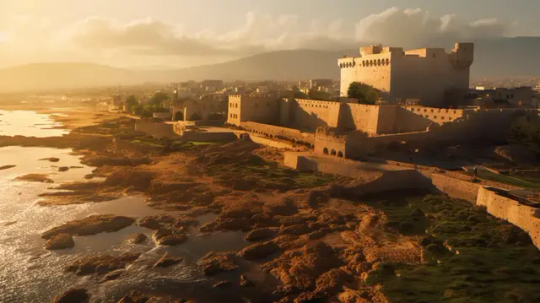
Embarking on a journey of exploration, adventure, and discovery is an inherent desire within the hearts of travel enthusiasts. Nestled on the captivating coastline of Syria lies the vibrant city of Tartus, a destination where the allure of history, tantalizing gastronomy, and exhilarating activities converge. Nestled in the heart of Syria, Tartus presents a fascinating tapestry of history and culture. Be sure to visit the Tartus Citadel, a magnificent fortress that has stood the test of time, offering panoramic views of the city and the azure Mediterranean sea. The culinary landscape of Tartus is a tantalizing fusion of Middle Eastern spices and fresh seafood. The city's bustling food markets are a must-visit. Seafood lovers will find themselves at home at the many seaside restaurants offering the freshest catch of the day against the backdrop of the picturesque coastline. Tartus offers a plethora of activities for adrenaline junkies and nature lovers alike. Adventure lovers can enjoy windsurfing or kiteboarding, harnessing the wind's power as they glide across the waves. As the sun sets, a captivating boat tour paints a picture of pure serenity. From luxurious seafront resorts to cozy boutique hotels, Tartus offers a range of accommodation options. Venturing beyond the city of Tartus, you'll find even more treasures. The ancient city of Arwad, located on a small island off the coast of Tartus, is a must-visit. For history enthusiasts, the nearby Crusader Castle of Krak des Chevaliers offers a glimpse into the past. - Best time to visit: The ideal time to explore Tartus is during the spring and autumn months (March to May and September to November) when the weather is pleasant and mild. - How to get there: Tartus can be reached by flying into Damascus International Airport and then booking a taxi or arranging a private transfer for the approximately two-hour journey to the city. - Money matters: It is recommended to carry local currency (Syrian pounds) for most transactions, although some establishments may accept major international credit cards. - Nightlife: While Tartus is not known for its bustling nightlife, there are several local cafes and bars where you can enjoy a relaxing evening. - Transportation: Taxis are readily available in Tartus. Alternatively, walking is a great way to soak in the city's vibrant atmosphere. - Shopping: Tartus is known for its local souks where you can find unique handicrafts, Persian rugs, and vibrant textiles. In conclusion, Tartus is a city that leaves an indelible mark on the souls of those who venture to its shores. This vibrant city invites you to immerse yourself in its culture, indulge in its gastronomy, and unleash your adventurer spirit. Discover the enchanting secrets of Tartus, a true gem of Syria. Read the full article
4 notes
·
View notes
Text
This scene had something we've needed to see for some time, two heroes' impressions of Akua's dilemma

Damn, Hanno not mincing any words (also is this the first time Cat's ever referred to as Akua's warden? Interesting)



There's no balancing the scales on one hundred thousand souls


Ouch, Tariq throwing in the kind of terms of endearment she uses with Cat must've stung

Good question, what would it take to convince someone to do good even when, and especially when, there is no reward. When the act of not doing good becomes unbearable, perhaps?

Catherine this plotting of yours may be your most monstrous, or perhaps your most virtuous, and I can't tell yet what it'll end up as.
Yeah this series is so fuckin good
#a practical guide to evil#apgte#apgte spoilers#live reading#spoilers#book 6 spoilers#akua sahelian#hanno of arwad#white knight#tariq isbili#grey pilgrim#catherine foundling
7 notes
·
View notes
Text
hanno of arwad youth pastor, catherine foundling reddit atheist
1 note
·
View note
Video
youtube
Aerial view of #Arwad Island, #Tartus, in #Syria @QUSAY_NOOR_
0 notes
Text
Isola di Arwad, Armée du Levant, 10 agosto 1934
Questa piccola isola dai mille nomi e ricchissima di storia è di fronte alla costa siriana.
#Arwad #Arouad #Rouad #Arados #AntiochedePieria #isoleminori #island #sea #mediterranean #photography #vintagephoto #vintagephotography #oldphoto #foundphoto #lostmemories #antiquephoto #oldphotos #oldphotograph #isoleminorifoto #blackandwhite #bn #tartus
instagram
0 notes
Text
The Megalithic Wall of Arwad built by an Ancient civilization of Giants - UFOmania - the truth is out there
https://helenastales.weebly.com/blogue/the-megalithic-wall-of-arwad-built-by-an-ancient-civilization-of-giants
View On WordPress
0 notes
Photo

#أرواد #طرطوس #Syria #Arwad #island #tartus #gull #mediterraneansea #Mediterranean #bird #birds #sea #seaside #boat #ship #sealight #lighthouse #photography #photo #pic #traveladdict #travel #travelingram #traveladdict #travelblog #travelphotography #discoverglobe #discover #discoverwildlife #discoverworld #unique https://www.instagram.com/p/B9Gt4Kzgyux/?igshid=d5frr04l365f
#أرواد#طرطوس#syria#arwad#island#tartus#gull#mediterraneansea#mediterranean#bird#birds#sea#seaside#boat#ship#sealight#lighthouse#photography#photo#pic#traveladdict#travel#travelingram#travelblog#travelphotography#discoverglobe#discover#discoverwildlife#discoverworld#unique
3 notes
·
View notes